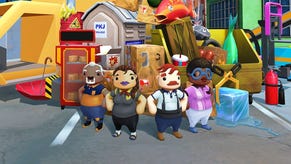Braben says used games has "really killed core games"
Single player games in danger, says Braben
The used games market is always a hot topic amongst developers and publishers who don't get a cut of any pre-owned sales. Frontier Development's David Braben argues that the used games business has effectively killed off the single-player focused endeavor, and he believes that not only are used games pushing more games to focus on a multiplayer setting, but he thinks those used games are helping to inflate prices on titles as studios seek ways to recoup lost revenues.
"The real problem when you think about it brutally, if you look at just core gamer games, pre-owned has really killed core games," reflected Braben. "In some cases, it's killed them dead. I know publishers who have stopped games in development because most shops won't reorder stock after initial release, because they rely on the churn from the re-sales."
"It's killing single player games in particular, because they will get pre-owned, and it means your day one sales are it, making them super high risk. I mean, the idea of a game selling out used to be a good thing, but nowadays, those people who buy it on day one may well finish it and return it."
"People will say 'Oh well, I paid all this money and it's mine to do with as I will', but the problem is that's what's keeping the retail price up -- prices would have come down long ago if the industry was getting a share of the resells."
Braben, who has worked on titles like Elite and Kinectimals, is currently facing a crisis on his current title, The Outsider. The game is heavily invested in single player story mechanics, but Braben remains somewhat skeptical of the current development landscape.
"Developers and publishers need that revenue to be able to keep doing high production value games, and so we keep seeing fewer and fewer of them."
If anything, there appear to be signs that some studios are simply, if not begrudgingly, moving to the mobile gaming space, where used-game sales simply do not exist. Braben has acknowledged that his studio is working on new IP specifically for mobile.
"I think the problem was that the market then was very confused, whereas nowadays it's far clearer. Of course, a lot of that is hats off to Apple, but also the principle of the App Store, which is fantastic," he remarked. "And that applies to a lot of platforms -- it applies to Android, and it now applies to Mac OS, and it's been announced for Windows 8 and I think that is a very interesting realignment of the stars."
[via Gamasutra]









